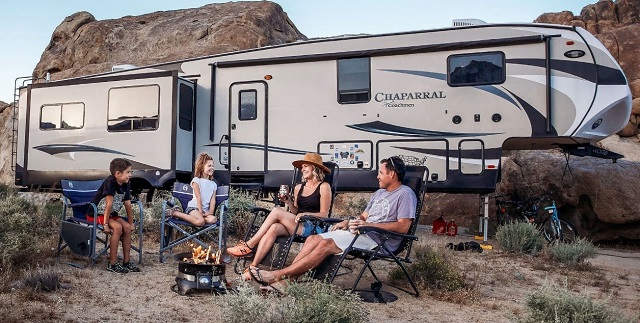If you find yourself away on business often and own an RV, renting it out can be a great way to generate income while you’re on the road yourself. Renting your house may not be as viable—perhaps your family still resides there while you’re traveling for business, or you aren’t completely comfortable with opening your house to strangers. Letting others experience your RV is a happy medium.
Here a few statistics on the growing popularity of road trips in the United States:
- According to com, 25% of surveyed travelers hoped to go on an “epic” road trip during 2018.
- MMGY Global found that, between 2017 and 2018, 39% of overall trips taken in the United States were road trips; up 17% from the year prior.
- A research study conducted by IPSOS found that 66% of Americans planned some type of road trip in 2017, though 56% were stressed about where to go and what stops to make along the way.
As a business owner who isn’t putting an RV or camper to great use, now is great time to capitalize on some of these trends and gain some extra income. And believe it or not, there are several peer-to-peer rental platforms where you can list your RV for rent, just as you’d list your home for rent on a platform like AirBnb.
Use Professional Photography
Professional photography is a must when it comes to listing your RV for rent. In fact, it can make or break your listing entirely. You’ll need the right lighting and a solid, professional camera. And while your smartphone might take some great photos, the difference between smartphone pictures and professional pictures is evident. If you don’t own a professional camera, rent one for a day or hire someone to take the photos for you. The upfront costs will pay for itself once the bookings start coming in, as your photos will attract more renters.
Take a look at campervan photos on Pinterest and think about the lifestyle that RVs and camper vans offer. Curate an entire experience for people, and make it easy for them to imagine what it would be like to travel in your vehicle. Staging is a great way to achieve this. You want prospective renters to not only know what your vehicle feels like. Throw pillows, draped blankets, and open books on the bed are just their own way to convey the on-the-road lifestyle aesthetic. Another idea: throw some maps, coffee mugs, and an old camera on the table. Be creative and have fun with your staging.
Create a Detailed Listing
Your listing is essentially your online advertisement. This is where you sell what you have to offer. Put yourself in the renter’s shoes. Your description should answer any potential questions that they have, and then some.
To make it easy, begin with the basics, like how big it is, how many people it can fit, and what features and amenities it includes. Then, you can move into specifics, describing the features that you’re proud of, like a new high-tech navigation system or surround sound. Think about the upgrades you’ve made since your original purchase. It also helps to take a look at other RVs comparable to yours to see how those listings are being advertised.
Upsell With RV Extras
Part of renting your RV is creating an experience. When a user is looking across dozens of different options, it can be very difficult to choose—especially when choosing between the same brands and models. As such, you can set yourself apart from other listings with upsells and accessories that matter most to drivers.
Fortunately, there are endless items you can include to indulge potential renters, from simply amenities like towels, bedsheets, and spices, to more luxury items like a portable espresso machine, portable projector, television, towels, camping chairs, and even a bottle of wine or two. Those extra touches go a long way for reviews as well.
Handling Insurance
Insurance is a tricky subject when it comes to renting out your RV. Your insurance company wouldn’t be happy if they found out you were renting your vehicle to a stranger, especially if an accident was involved. However, there are smart, legal ways to approach this. First and foremost, you should have a reliable insurance policy for yourself, especially one that caters to RVs. However, talk to your provider about potential plans that you can take advantage of which would cover you in the event of an accident while the vehicle is out of your hands.
You should also be sure to service your RV and get it checked before you allow others to use it. If you’re savvy with mechanics, you can do this yourself. Search for spare parts for your electronics and under your hood using a database search like Octopart. After all, taking preventative measures ensures you’re better safe than sorry.
You should also request a commercial rental insurance policy, which would protect you if an injury or property damage occurred. Additionally, many popular platforms offer RV rental insurance coverage directly through their platform, however, it’s best for you to have your own policy in place for a thicker cushion of protection.
This post was last modified on March 11, 2020 9:58 AM

